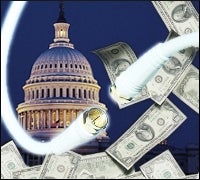 |
WASHINGTON — A House panel today held the first of several planned hearings on the broadband funding allocated in the economic stimulus package, urging the officials administering the grants to move judiciously as they race to disperse the money.
Members of the House Subcommittee on Technology, Communications and the Internet stressed the importance of their role in overseeing the process because so many of the details of the broadband programs are left to the agencies to determine.
At the same time, Rick Boucher, the Virginia Democrat who chairs the subcommittee, stressed the urgency of the broadband mission, citing a recent study that ranked the United States 16th in the world by the measurement of percentage the population signed up for high-speed service.
“For the sake of our national economy we’ve got to do better,” Boucher said. Broadband, he said, is “as essential as telephone and electricity services were when they were introduced more than 100 years ago.”
But the benefits of broadband, from jobs to healthcare to energy, are hardly controversial. More nettlesome are the details over how the $7.2 billion should be spent, particularly key terms like “unserved” and “underserved” that the statue directs the agencies to define.
For their part, the agencies charged with administering the programs are wrapping up a period of public comment as they determine how the criteria of the grant-review process.
The Rural Utilities Service (RUS), a division of the Department of Agriculture that received $2.5 billion of the money, will close its public comment period on April 13, and publish its notice of funding availability 60 days later. The Commerce Department’s National Telecommunications Information Administration (NTIA), which is administering the remainder of the funds, is working under a similar timetable.
The law directs RUS and NTIA to obligate the funds by the end of fiscal 2010, with projects required to be “substantially complete” two years later.
With the comment period still open, representatives of those agencies could not be pinned down on what areas will be deemed unserved or underserved, designations which would prioritize funding under that statute.
Questions abound: could communities with access to Wi-Fi be considered underserved? What about emerging technologies, such as WiMAX?
“I can tell you that we’ve heard a range of opinions,” Mark Siefert, NTIA’s senior policy advisor told the panel, adding reflexively that his agency’s priority is to deliver the fastest service to the largest number of people at the lowest cost.
But the representatives had plenty of suggestions. As the agencies consider which areas are most deserving of stimulus-funded network-expansion projects, Boucher urged them to consider issues like what speeds are available, whether the market is competitive, and how expensive service is. By the chairman’s reckoning, a market could be underserved even if it had several providers but each only offered slow connection speeds.
For Florida’s Cliff Stearns, the ranking Republican on the subcommittee, projects that would serve areas deemed unserved should automatically vault ahead of all other grant applications. But before those decisions are made, Stearns argued that the agencies need to develop a comprehensive map to pinpoint which areas have the lowest availability and adoption rates.
“It’s common sense to know where we should spend the money before the money is actually spent,” Stearns said.
The bill allocates up to $350 million to the NTIA to develop a national broadband map, a project many states have already undertaken.
“Put very simply a state needs to know where broadband is, and where it ain’t before it spends its money,” said Rachelle Chong, commissioner of the California Public Utilities Commission.
The bill also directs the Federal Communications Commission to develop and report to Congress a national broadband strategy within a year.
Boucher described the stimulus funds as “an important first step” toward universal broadband strategy, but nothing more.
“This stimulus fund, ample as it is, is insufficient to achieve that larger purpose,” Boucher said.
The FCC is planning to kick off the march toward a national broadband strategy at its meeting next week.


